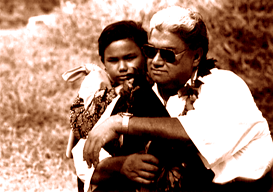BESTOW ON THE STUDENT HIS KNOWLEDGE

The "ORAL TRADITIONS" of our Culture passes on from one Generation to another... by being the Story Teller -- KAULUWEHI passes his knowledge on to his Mo`opuna -- and thus the knowledge is bestowed... like the following story.
THE KOHOLA IN HAWAI`I
Humpback Whales and the Hawaiian
By Charles Kauluwehi Maxwell Sr.("Uncle Charlie")
Published in Na Po`e Hawai`i

The modern day name for the uninhabited island seen off the coast of
Wailea, Maui is Kaho`olawe, though our chants tell us that its ancient name
was Kanaloa. Kanaloa was a primordial god from antiquities, and was the
deity for the ocean, its animals, fresh water, salt water, and all the growth
on earth and in the sea. On the northwest side of Kaho`olawe is Ahupu Bay,
whose west point is called Lae O Na Kohola, or Cape of Whales.
In 1991 a very spiritual incident occurred on the last night that we buried the last remains at Honokahua. At midnight we were ready to start our burial rituals when we heard a loud slapping coming from Honokahua Bay. As we looked over the hill into the bay we saw an outline of a whale lying on its side, rhythmically hitting the water with its pectoral fin. After about 15 minutes it stopped, and we went back to the burial pit. As we started our ceremonies, several owls flew over head and screamed, then headed for the mountains. This was the Ho`ailona, the sign that our Kupuna where back reunited with their Iwi, bones. While the burials were taking place, a song came to me which tells of the nights events. The name of the song is Ka Ho`ailona (the sign) which was recorded by the Pandanus Club in 1992, from the CD called, 'Te Tama.' In English it says:
The Kohola (whale) was well known to the early Hawaiians. In the Kumulipo
chant -- the Hawaiian chant of creation --- the Second Era speaks of the
birth of the whale: "Hanau ka palaoa noho I kai" --- born is
the whale living in the ocean. And the pauku, or poetic passages, addresses
the familiar scene in native Hawaiian culture of whales parading through
the 'Alalakeiki Channel between Maui and Kaho`olawe. This seasonal phenomenon
reminds us constantly that from the time of our native Hawaiian ancestral
migration, Kanaloa and his many ocean forms were continuously associated
with the island Kanaloa.
The whale is the largest ocean form, and a majestic manifestation of Kanaloa.
From the ivory of this creature, the highly prized niho palaoa was worn
by the Ali`i (Chiefs) of high rank. The scarcity and beauty of the niho
lei palaoa and its connection to Kanaloa brought mana (spiritual power)
to the carver, to the pendant itself, and eventually to the wearer of the
pendant. The ALI`I possessed this kinolau or body form of this great god,
would themselves acquire the characteristics, intelligence and knowledge
of the god. Therefore, it would be advantageous for any Ali`i to secure
the ivory whale tooth of this Kanaloa body form.
The Kohola is revered in modern day Hawai`i not only by the thousands of
whale watchers, but by the native Hawaiians who still consider it as one
of Kanaloa`s magnificent creations. In 1990, I was one of the fortunate
ones that was touched by the Kohola. Several of us were involved in relocating
the Ritz Carlton Hotel in Honokahua. Originally, the hotel was supposed
to be built over ancient Hawaiian burial grounds. After strong objections
from the Hawaiian community, it was relocated to its present site.
I was one of seven people chosen to rewrap the thousands of remains that
had been dug up. The remains dated between A.D. 850 and the early 1800's.
There were numerous Niho Lei Palaoa (whale tooth necklaces), from one to
six inches in length. This would indicate that royalty of all ages were interred with their symbols of nobility.
Summoning the spirits back
With the flames from the torches as a guide
They came from the heavens above
They came from Tahiti and Aotealoa (New Zealand)
To continued their eternal rest
And again reunite with their bones
In this land called Honokahua
They did not know how to thank these men
Who laid their bones to rest
So they called upon the Kohola
Who slapped the waters of the bay
In view was an owl, indeed it is a sign
Their presence are here our great ancestors
Inhaled was their fragrance, by the
Beautiful blossoms, today's people
In Honokahua, yes the adornment of Maui
We will always remember
The place of my birth
Where the sign was given
that our Kupuna (ancestors) are at rest.
(Note: the author was born about a mile from these burials at Napili. He also wrote the song 'Honokahua Nani E,' which was recorded by the Pandanus Club in 1989 and won the 'Album of the Year' at the 1990 Na Hoku Hanohano)